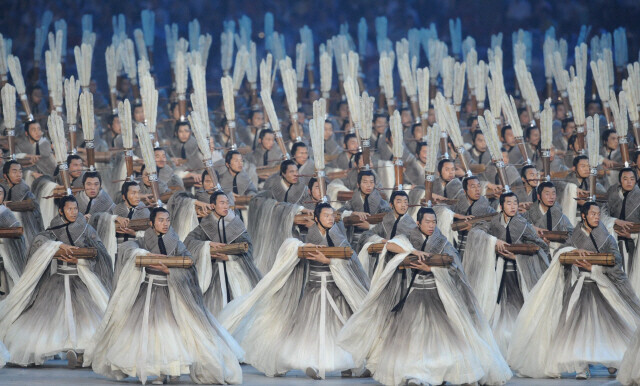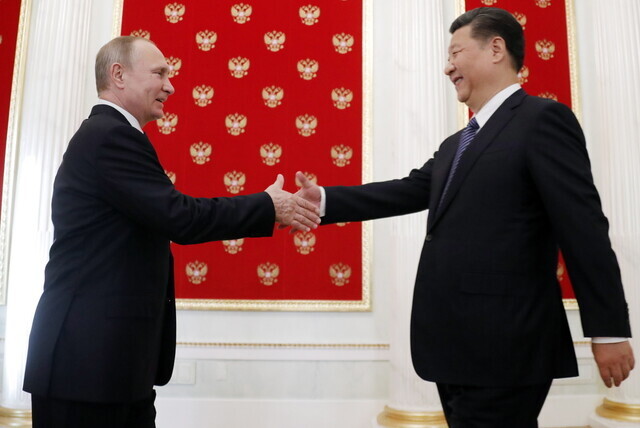hankyoreh
Links to other country sites 다른 나라 사이트 링크
[Column] A Beijing Olympics for a new era


On Aug. 8, 2008, at the stroke of 8:08 pm, I was there as the opening ceremony of the Beijing Olympic Games kicked off. On the midsummer night, leaders including South Korean President Lee Myung-bak and US President George W. Bush, sat side by side with Chinese leaders, including President Hu Jintao.
It was the culmination of the “Chimerica” era, in which the US and China closely cooperated on the so-called war on terror and economic interests.
The opening performance, directed by Zhang Yimou, began with a passage from “The Analects” of Confucius and the booming of drums played by 2008 people. This spectacle seemed to declare to the world that China developed into greatness by combining Chinese tradition with advanced technology.
But as soon as the Olympics were over, Lehman Brothers in the US went bankrupt, and both the US and the world were plunged into a financial crisis.
China was the first to recover from the crisis thanks to massive state-led stimulus measures. In China, many started to say that the Chinese model was superior to the American one and that there was indeed nothing else China had to learn from the US.
Around the world, expectations were growing that China — an Asian country that had experienced imperialist aggression — would present an alternative to the world order of US hegemony.
Then, the Obama administration, which came to power in the wake of the financial crisis, launched a “pivot to Asia” strategy to contain China. In 2009, China began claiming that Taiwan, the South China Sea, Tibet, and Xinjiang were “core interests” that were never to be intervened on by outsiders. At a meeting of the foreign ministers of ASEAN member states in July of 2010, Chinese Foreign Minister Yang Jiechi addressed countries refuting China's claim to the South China Sea, saying, "China is a big country and you are small countries, and that is a fact.”
Meanwhile, labor movements and civil society were on the rise within China’s borders. The Chinese leadership, which for a time had accepted and compromised on calls for change coming from below, began to worry that the Communist Party’s rule would be shaken if nothing was done.
The tacit promise of gradual political reform all but disappeared, and a movement to strengthen the authoritarian regime in China started turning its wheels. In the economy, where the private sector had been expanding its role, forces trying to reinforce “Chinese-style state capitalism” took the lead.
Then China joined hands with Russia. At the 2009 Shanghai Cooperation Organization summit, Putin was said to have pulled Hu Jintao to the side to warn him that if he didn’t get control of NGOs in China, China would “end up with a revolution on its hands.”
Moreover, in 2014, when Russia annexed Ukraine’s territory in Crimea, China started building artificial islands and military facilities in the South China Sea.
Now, Putin is once again threatening Ukraine militarily and demanding that the US recognize Russia's "sphere of influence," while Chinese President Xi Jinping is pressing the possibility of "armed reunification" with Taiwan.
The imperial dreams of China and Russia, which both see the US as a security threat, are shaking the world order.

Now, 14 years after the Beijing Summer Olympics set the tone for so much global change, the Beijing Winter Olympics are set to begin on Feb. 4.
Xi Jinping, who consolidated his power by passing a third "historical resolution” late last year, is trying to show off his country’s status as a powerful nation and use this opportunity as a stage to secure legitimacy to obtain long-term power at the 20th Communist Party Congress this fall.
This means that 2022 is likely to be a year during which the Chinese leadership's mobilization of patriotism and social control will only grow stronger.
Indeed, in order to maintain his major achievement of zero-COVID in China, Xi is continuing with the blockade of cities and with the purging of officials on grounds of anti-corruption.
The US-China conflict is also likely to intensify further as the Biden administration, ahead of the midterm elections in November, will probably increase the intensity of its checks on China throughout the year.
The US will likely continue to challenge China on various fronts such as security, information and communication technology, supply chain reorganization, and raw materials. In turn, China’s counterattacks are also likely to ramp up.
Regarding relations between South Korea and China, this year's presidential election and the 30th anniversary of the establishment of diplomatic ties between Korea and China should serve as an opportunity for South Korea to reorganize its diplomatic strategy amid the current shake-up in the world order.
First of all, South Korea must change its diplomatic policy towards China — a policy that has focused disproportionately on obtaining China's cooperation on the North Korean issue. Given China's decision to prioritize stability for North Korea over denuclearization, the more South Korea pushes for Chinese cooperation on inter-Korean relations, the more its diplomatic position weakens.
Moreover, with China strengthening its focus on economic self-reliance, South Korea should focus more on preparing alternatives to reduce its excessive economic dependence on China.
This is important since it’s difficult to predict when exactly relations between South Korea and China can go back to pre-THAAD times — when China introduced a series of boycotts and measures against Korean companies and products.
Another crucial point for South Korea is the need for cooperation with the international community. We have no choice but to strengthen cooperation with like-minded countries that also strive for improvements in human rights, democracy, peace, technological innovation and more.
While firmly confronting those who incite irresponsible and regressive rhetoric alluding to anti-communism or Sinophobia, Korean progressives should approach China with the same starting footing of criticizing the hegemony of great powers, standing in solidarity to maintain peace, and working to promote and protect the rights of downtrodden.
The Blue House has now said that President Moon Jae-in will not attend the opening ceremony of the Beijing Winter Olympics and that the exact composition of the Korean delegation is still being considered. Even if Korea is not participating in the diplomatic boycott, I hope it can convey that South Korea does not turn a blind eye to the suffering of the oppressed in China.
Please direct questions or comments to [english@hani.co.kr]

Editorial・opinion
![[Column] Season 2 of special prosecutor probe may be coming to Korea soon [Column] Season 2 of special prosecutor probe may be coming to Korea soon](https://flexible.img.hani.co.kr/flexible/normal/500/300/imgdb/original/2024/0426/3317141030699447.jpg) [Column] Season 2 of special prosecutor probe may be coming to Korea soon
[Column] Season 2 of special prosecutor probe may be coming to Korea soon![[Column] Park Geun-hye déjà vu in Yoon Suk-yeol [Column] Park Geun-hye déjà vu in Yoon Suk-yeol](https://flexible.img.hani.co.kr/flexible/normal/500/300/imgdb/original/2024/0424/651713945113788.jpg) [Column] Park Geun-hye déjà vu in Yoon Suk-yeol
[Column] Park Geun-hye déjà vu in Yoon Suk-yeol- [Editorial] New weight of N. Korea’s nuclear threats makes dialogue all the more urgent
- [Guest essay] The real reason Korea’s new right wants to dub Rhee a founding father
- [Column] ‘Choson’: Is it time we start referring to N. Korea in its own terms?
- [Editorial] Japan’s rewriting of history with Korea has gone too far
- [Column] The president’s questionable capacity for dialogue
- [Column] Are chaebol firms just pizza pies for families to divvy up as they please?
- [Column] Has Korea, too, crossed the Rubicon on China?
- [Correspondent’s column] In Japan’s alliance with US, echoes of its past alliances with UK
Most viewed articles
- 1‘We must say no’: Seoul defense chief on Korean, USFK involvement in hypothetical Taiwan crisis
- 2AI is catching up with humans at a ‘shocking’ rate
- 3The dream K-drama boyfriend stealing hearts and screens in Japan
- 4[Column] Can we finally put to bed the theory that Sewol ferry crashed into a submarine?
- 5S. Korea “monitoring developments” after report of secret Chinese police station in Seoul
- 6[Editorial] Yoon cries wolf of political attacks amid criticism over Tokyo summit
- 7Doubts remain over whether Yoon will get his money out of trip to Japan
- 8[Photo] “Comfort woman” survivor calls on president to fulfill promises
- 9[Editorial] Was justice served in acquittal of Samsung’s Lee Jae-yong?
- 101 in 5 unwed Korean women want child-free life, study shows